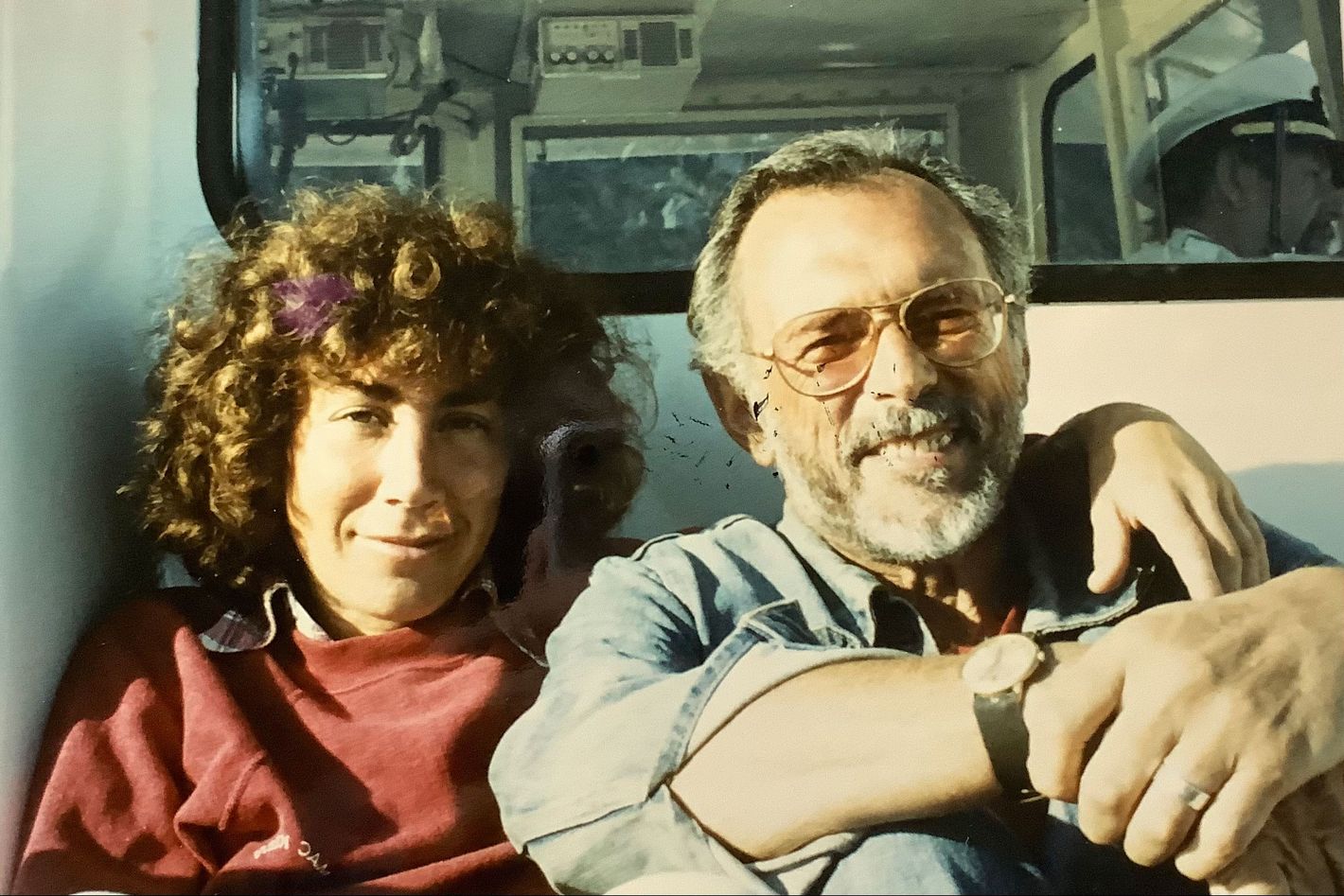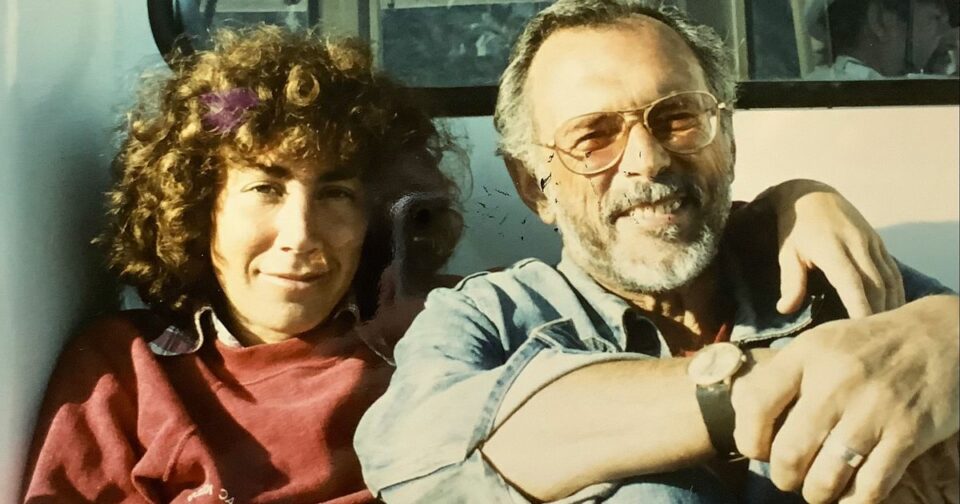
When Jill Ciment met the painter Arnold Mesches in 1970, she was his student in a small Beverly Hills drawing class. She was 16 and uncannily independent, more than ready to escape her unstable childhood. Arnold, who was 47 and married with two children, took her seriously, showing her images from an ink-splattered book of Renaissance art and politely ignoring the fact that she left an empty spot on her drawing pad instead of sketching the life model’s penis.
After the last day of class, Jill stayed behind and, before he could react, unbuttoned her peasant blouse partway and kissed him. A few months and one birthday later, she came to his studio unannounced and they had clumsy but passionate sex. After some hesitation and anxious negotiation, Arnold left his wife, and his relationship with Jill began; they lived, at first, at a friend’s modern hillside bungalow in Bel Air. Eventually — as Ciment later wrote in her 1996 memoir Half a Life — they got married and existed together happily, two artists who saw themselves as equals.
Except actually, Arnold teased his teenage student about the blank circle in her drawing where the model’s penis should have been. On the last day of class, he was the one who initiated their first kiss. The first time they had sex, he couldn’t get hard, so he taught her how to give a blowjob. Their bedroom at that house in Bel Air was decorated for their friend’s granddaughter, and it was “a pedophile’s daydream,” princess pink and filled with Barbies.
In her new memoir, Consent, Ciment scrutinizes and revises the facts of her life she laid out in her first one.Back in the ’90s, she tried to “recreate my hard-scrabble childhood with enough swagger that the reader didn’t feel sorry for me,” she writes in her new book. Now, she is trying it again without swagger — or with the different sort of bravado of a woman in her 60s. On the other side of MeToo and her husband’s death from leukemia, Ciment has a different story to tell. Her consciousness has been raised. Arnold is no longer there to influence her memories. She can now freely judge what kind of person he really was.
Ciment is an accomplished writer with seven novels to her name, and she’s so capably deadpan that many lines teeter between tragedy and comedy. She seems to find something darkly funny about their early days together, when she would have been in high school if she hadn’t dropped out. “Arnold was having an affair,” she writes at one point. “I was going steady.” It’s like she’s telling us we’re allowed to laugh. That feels like a relief, even though there’s also something uncomfortable about it.
As she tells it in her memoirs, although the people around them don’t all approve of their relationship — when it begins, her mother, Gloria, rages, cries, and calls him “the perv” — no one describes it as abusive, and many are amused or openly titillated. It’s a little hard to imagine in our era of age-gap sensitivity. On Twitter, even five-year differences are passionately debated by earnest Gen-Zers and stan armies searching for ammunition.
If things were very different in the ’70s, they hadn’t changed too much by 1996. A review ofCiment’s first memoirin The Nation that year says Jill “stole another woman’s husband, thirty years her senior, because she loved him and needed him.” Surely, the reviewer writes, Arnold — torn between his longtime wife and his young student — faced a dilemma of his own: “whatever he chose to do would be a crime against love.” There’s no mention of any actual crime. In her first book, Ciment doesn’t talk about the legality of their relationship either. But in Consent, it’s mentioned on page five. “California’s age of consent is eighteen,” she writes. “There is a Romeo and Juliet clause in cases of statutory rape that forgives lovers close in age, but obviously that didn’t apply here.”
Arnold is no longer there to influence her memories. She can now freely judge what kind of person he really was.
You get the feeling that the 69-year-old Ciment is cross-examining her middle-age self — as though that 44-year-old who wrote the first memoir is Arnold’s co-conspirator — in a trial for the defense of young Jill. It isn’t clear to Ciment why she omitted or massaged plot points when she wrote her first biography. She wasn’t protecting her husband, she decides, and she doesn’t believe she was seeking a retroactive sense of empowerment by painting herself as the sexual aggressor. Maybe she was just limited by the vocabulary of her time: In memoirs, she says, “the reader often learns more about the period in which the book was written than the period that is being written about.” She can finally ask, “now that Arnold is no longer here to sway or dispute me,” whether her long, satisfying marriage was “fruit from the poisonous tree.”
Not that the point of the book is to establish Arnold’s guilt, at least not entirely. Ciment’s belief in their compatibility is mostly unchanged, despite the fact that she’s unsure about whether she might have been, at one point or another, what someone might call a victim. “Even after more than four decades of marriage to him, try as I might, I cannot imagine how he was justifying his behavior to himself,” Ciment writes about an imploring letter he sent her after they first slept together in his painting studio. The revelation that she never asked him why he sent that letter is one of the strange moments that makes the memoir both confusing and plausible: It’s exactly the kind of crucial detail that a happy couple would overlook — or avoid.
The age-gap memoir is a mini-genre of its own, and Ciment’s story is an unusual entry. A lot of these books end with the author emerging on the other side, freed from the manipulation or influence of someone they’ve finally realized is just way too old for them — if not an outright predator. In 2020, Vanessa Springora published her own memoir, also titled Consent (Le Consentement in French),about her relationship with the author Gabriel Matzneff, who was then 49; she was 14. Beyond cosmetic details, the differences between her book and Ciment’s are stark. Ciment approaches her life like it’s an interesting toy to take apart and put together again. Springora seems to be smashing it with a sledgehammer. Matzneff, an open pedophile who was embraced by the French literary world, “was not a good man,” she writes. “Our affair was a dream so powerful that nothing, not a single one of the few warnings I received from those around me, was enough to awaken me. It was the most perverse nightmare. A violence that had no name.” The book is unequivocal about his depravity.
Joyce Maynard’s At Home in the World, about her eight-month relationship with J.D. Salinger when she was a college freshman and he was in his 50s, is also unnerving. Salinger, who began sending her long, flattering letters after she wrote an article for The New York Times Magazine,brings her in with romantic bluster — “I’m just happy knowing you and I exist on this planet of aliens” — and then turns sour, criticizing her mother, her classmates, her editors.
Maynard’s memoir, published in 1998, was met with even sharper suspicion than Ciment’s 1996 book. The author, Maureen Dowd wrote then, was an exhibitionistic sexual climber, “the Leech Woman of the boomer generation.” (Monica Lewinsky was the Leech Woman of Gen X, she decides.) “Experiencing the ordinary brutality of love does not make one a victim,” Dowd said. “It makes one an adult. Or it should.” After Me Too unfolded, Maynard wrote a rebuttal that lays out the damage incurred by the memoir’s reception. She had told a “forbidden story” and suffered the consequences.
Ciment’s new memoir has a lot of the same beats as others in its genre. Young Jill is drawn in by an older man’s artistic sensibility and sexual knowledge. She’s brutally honest about both the inelegance of the arrangement — Arnold’s sagging middle-aged neck is a fixation — and the small shivers of power she gets from being the (much) younger woman. And like Maynard, Springora, and other memoirists, she repeatedly struggles to understand why her mother allowed it to happen at all. “Maybe he’ll tame you,” Gloria says at one point.
Halfway through Consent, a different story bubbles up. Not long after Jill leaves her family home to live with Arnold, her mother and her two younger brothers move to a different town 70 miles away. There, their new neighbor, a single father named Burt, starts inviting the boys over to play with his children. Gloria is suspicious for an instant — “she caught a whiff of something that alarmed her, like the scent of a nearby fire” — but can’t bring herself to turn down the invitations to Disneyland and camping trips. The man, it turns out, is part of a proto-NAMBLA group of pedophiles, and she finds out too late to protect her youngest son.
When the police show up, Arnold is an object of suspicion: an ambiguously attached older man, half father, half boyfriend. But this is the moment when he seems to prove himself to Gloria and, maybe, to us. “I want him here,” Gloria says when the police detective asks him to wait outside during questioning. Later, he goes to pick up pizza. “He must have been aware that he, like Burt, had benefited from the vulnerability of fatherless children,” Ciment writes. But the triangulation with this irrefutable abuser puts him out ahead.
After this, the book changes. Its next halfstares down what Ciment calls “the second part of sleeping with your professor”: they move to New York, develop their careers, and grow older. Arnold dies in 2016, at 93. If the first part of the memoir is like an interrogation, the second feels like it has nothing to prove. The tension between Jill and Arnold goes a little slack, and the book becomes more about minor annoyances and affections — all despite her confusion about how it began.
Consent is an unusual book, short and blunt but sly about its intentions. In the beginning, it’s hard to know where we stand: Is this a victim’s memoir, or is it the story of a happy marriage? Ciment doesn’t seem to care to choose. If a memoir, like she says, is a record of the time it is written, this one might say that we’re ready for some ambivalence.
Related
- The Age Gappers
- The Case for Marrying an Older Man
Emma Alpern , 2024-06-14 16:00:55
Source link


